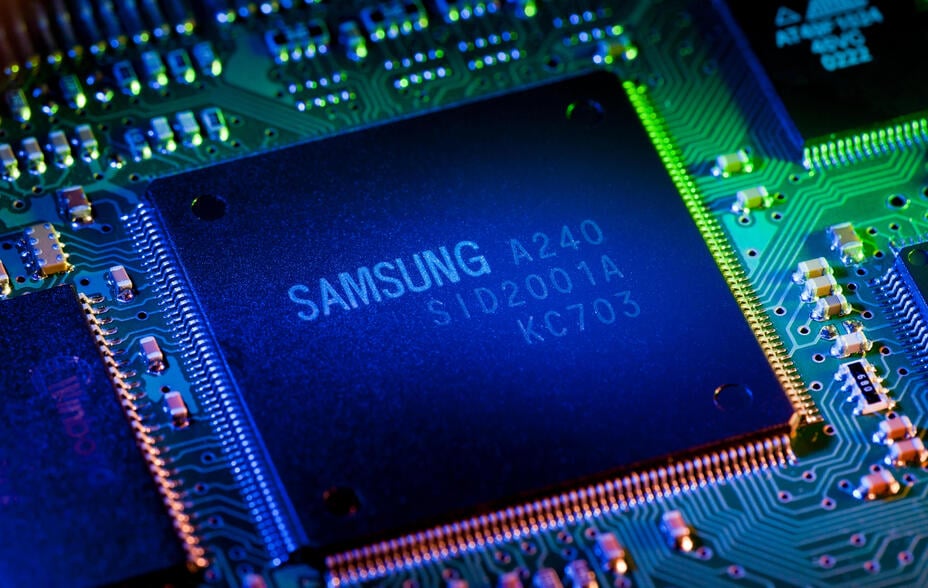The EM Team explores how Samsung turns challenges into opportunities for future growth.
Although there have been pockets of turbulence, AI has driven strong demand and strong share prices throughout the semiconductor sector. The one notable exception has been Samsung Electronics. Why is this?
It appears that Samsung is currently facing challenges across a number of its businesses. Are these temporary disruptions or are they harbingers of deeper lying problems?

As with any investment, your capital is at risk.
Samsung Electronics (“Samsung”) is a complicated beast with a number of moving parts combined together as a conglomerate or chaebol. In the interests of simplicity, it is best to break down the company into three broad areas: its Device Solutions division which incorporates its memory and logic semiconductor businesses (25 per cent FY23 revenue); its Device eXperience division which manufactures smartphones, TVs and home appliance (66 per cent FY23 revenue); and Samsung Display which makes display panels for its own and competitors’ smartphones and televisions (12 per cent FY23 revenue). Samsung’s current difficulties mostly lie in its Device Solutions division.
While TSMC is making hay-producing chips for NVIDIA, Samsung is struggling to maintain its position as a credible second source for AI chip designers. While Samsung was competitive with TSMC at the 5 nanometre (“nm”) and 4nm nodes, it has fallen behind at 3nm. At the end of quarter two of 2024, estimates put TSMC’s market share at 62 per cent and Samsung’s at 13 per cent, a distant number two.
However, Samsung made a big process change at 3nm and is still grappling with some of the technical difficulties, but pain taken now should smooth its progress with the next leading node, 2nm, which uses a similar process. While TSMC has served its chip customers well, the likes of Apple, NVIDIA, Broadcom, Qualcomm and AMD would all like Samsung’s foundry business to be competitive.
Samsung’s most important business is making DRAM (predominantly for computers) and NAND (predominantly for smartphones) memory chips. Over a number of years and through various cycles, DRAM has become consolidated to essentially a three player market of Samsung, SK Hynix and Micron. NAND is less concentrated with as many as seven credible players.
In legacy DRAM and NAND, there is little growth at present and increasing competition as China strives for self-sufficiency in the face of US chip restrictions. However, the one area where there has been strong demand is high-end memory chips for servers, but especially for high bandwidth memory (“HBM”) chips used in AI accelerators.
Unfortunately for Samsung, its South Korean competitor SK Hynix has stolen a march on HBM chips (both are held in your portfolio). In particular, SK Hynix is the dominant supplier to NVIDIA, while Samsung is still yet to qualify as a supplier of the highest specification HBM3 chips. However, as with its foundry business, AI customers would very much like a second source to SK Hynix.
In the long run, Samsung does potentially have a unique competitive advantage. Unlike the other semiconductor giants, Samsung could potentially be a one-stop shop for AI accelerators. It could manufacture its customers’ logic chips in its foundry and then package them with Samsung’s own HBM chips - all in-house. This vertical integration has the potential to increase efficiency and lower costs for its customers.
On the Device eXperience side of the business, Samsung continues to hold significant market shares across a number of devices including smartphones, tablets and televisions. Samsung was the first brand to incorporate a degree of AI in its Galaxy S24 smartphone and the first to successfully manufacture phones with foldable screens. Despite these technological advances, Samsung continues to suffer competition from Apple and Chinese brands but has managed to maintain a global market share of 18.3 per cent.
Meanwhile, in televisions, Samsung has been the leading brand for 18 consecutive years with a 30.1 per cent market share. While growth has been pedestrian for many of these devices in recent years, it remains the case that if AI proves to have any utility, then it will drive a large replacement cycle, which should benefit Samsung considerably.
Samsung has historically been an aggressive spender in R&D, investing over US$20bn in each of the last three years. As a result, the company filed over 106,000 patent applications between 2019 and 2022, the most by any company over the period according to a NASDAQ report. Ally this to a culture where executives were mandated to work a six-day week earlier this year and it is clear that Samsung’s historical cultural strengths of innovation and competition remain intact.
However, potentially the biggest lever that Samsung has is to start spending the US$75bn that the company has in cash. In addition, with this amount of cash, the company does not have to limit itself to expanding its capabilities in its existing businesses; capital allocation will be critical. In the short term, Samsung is deploying US$7.2bn in share buybacks, in line with South Korea’s ‘Value-Up’ programme, which should support the share price.
As things stand, we view Samsung’s difficulties as temporary and are willing to be patient. In particular, current valuations of approximately 1.0x Price/Book have historically marked a trough for the company, so much of the bad news is in the price. The EM Team is currently undertaking a review of Samsung and unless some ‘unknown unknowns’ come to light, it is likely that, having been in many of our clients’ portfolios for over a decade, it will remain so for years to come.
Risk factors
The views expressed should not be considered as advice or a recommendation to buy, sell or hold a particular investment. They reflect opinion and should not be taken as statements of fact nor should any reliance be placed on them when making investment decisions.
This communication was produced and approved in December 2024 and has not been updated subsequently. It represents views held at the time of writing and may not reflect current thinking.
This communication contains information on investments which does not constitute independent research. Accordingly, it is not subject to the protections afforded to independent research, but is classified as advertising under Art 68 of the Financial Services Act (‘FinSA’) and Baillie Gifford and its staff may have dealt in the investments concerned.
All information is sourced from Baillie Gifford & Co and is current unless otherwise stated.
The images used in this communication are for illustrative purposes only.
Important information
Baillie Gifford & Co and Baillie Gifford & Co Limited are authorised and regulated by the Financial Conduct Authority (FCA). Baillie Gifford & Co Limited is an Authorised Corporate Director of OEICs.
Baillie Gifford Overseas Limited provides investment management and advisory services to non-UK Professional/Institutional clients only. Baillie Gifford Overseas Limited is wholly owned by Baillie Gifford & Co. Baillie Gifford & Co and Baillie Gifford Overseas Limited are authorised and regulated by the FCA in the UK.
Persons resident or domiciled outside the UK should consult with their professional advisers as to whether they require any governmental or other consents in order to enable them to invest, and with their tax advisers for advice relevant to their own particular circumstances.
Financial intermediaries
This communication is suitable for use of financial intermediaries. Financial intermediaries are solely responsible for any further distribution and Baillie Gifford takes no responsibility for the reliance on this document by any other person who did not receive this document directly from Baillie Gifford.
Europe
Baillie Gifford Investment Management (Europe) Ltd (BGE) is authorised by the Central Bank of Ireland as an AIFM under the AIFM Regulations and as a UCITS management company under the UCITS Regulation. BGE also has regulatory permissions to perform Individual Portfolio Management activities. BGE provides investment management and advisory services to European (excluding UK) segregated clients. BGE has been appointed as UCITS management company to the following UCITS umbrella company; Baillie Gifford Worldwide Funds plc. BGE is a wholly owned subsidiary of Baillie Gifford Overseas Limited, which is wholly owned by Baillie Gifford & Co. Baillie Gifford Overseas Limited and Baillie Gifford & Co are authorised and regulated in the UK by the Financial Conduct Authority.
Hong Kong
Baillie Gifford Asia (Hong Kong) Limited 柏基亞洲(香港)有限公司 is wholly owned by Baillie Gifford Overseas Limited and holds a Type 1 license from the Securities & Futures Commission of Hong Kong to market and distribute Baillie Gifford’s range of collective investment schemes to professional investors in Hong Kong. Baillie Gifford Asia (Hong Kong) Limited 柏基亞洲(香港)有限公司 can be contacted at Suites 2713–2715, Two International Finance Centre, 8 Finance Street, Central, Hong Kong. Telephone +852 3756 5700.
South Korea
Baillie Gifford Overseas Limited is licensed with the Financial Services Commission in South Korea as a cross border Discretionary Investment Manager and Non-discretionary Investment Adviser.
Japan
Mitsubishi UFJ Baillie Gifford Asset Management Limited (‘MUBGAM’) is a joint venture company between Mitsubishi UFJ Trust & Banking Corporation and Baillie Gifford Overseas Limited. MUBGAM is authorised and regulated by the Financial Conduct Authority.
Australia
Baillie Gifford Overseas Limited (ARBN 118 567 178) is registered as a foreign company under the Corporations Act 2001 (Cth) and holds Foreign Australian Financial Services Licence No 528911. This material is provided to you on the basis that you are a “wholesale client” within the meaning of section 761G of the Corporations Act 2001 (Cth) (“Corporations Act”). Please advise Baillie Gifford Overseas Limited immediately if you are not a wholesale client. In no circumstances may this material be made available to a “retail client” within the meaning of section 761G of the Corporations Act.
This material contains general information only. It does not take into account any person’s objectives, financial situation or needs.
South Africa
Baillie Gifford Overseas Limited is registered as a Foreign Financial Services Provider with the Financial Sector Conduct Authority in South Africa.
North America
Baillie Gifford International LLC is wholly owned by Baillie Gifford Overseas Limited; it was formed in Delaware in 2005 and is registered with the SEC. It is the legal entity through which Baillie Gifford Overseas Limited provides client service and marketing functions in North America. Baillie Gifford Overseas Limited is registered with the SEC in the United States of America.
The Manager is not resident in Canada, its head office and principal place of business is in Edinburgh, Scotland. Baillie Gifford Overseas Limited is regulated in Canada as a portfolio manager and exempt market dealer with the Ontario Securities Commission (‘OSC’). Its portfolio manager licence is currently passported into Alberta, Quebec, Saskatchewan, Manitoba and Newfoundland & Labrador whereas the exempt market dealer licence is passported across all Canadian provinces and territories. Baillie Gifford International LLC is regulated by the OSC as an exempt market and its licence is passported across all Canadian provinces and territories. Baillie Gifford Investment Management (Europe) Limited (‘BGE’) relies on the International Investment Fund Manager Exemption in the provinces of Ontario and Quebec.
Israel
Baillie Gifford Overseas Limited is not licensed under Israel’s Regulation of Investment Advising, Investment Marketing and Portfolio Management Law, 5755–1995 (the Advice Law) and does not carry insurance pursuant to the Advice Law. This material is only intended for those categories of Israeli residents who are qualified clients listed on the First Addendum to the Advice Law.
Singapore
Baillie Gifford Asia (Singapore) Private Limited is wholly owned by Baillie Gifford Overseas Limited and is regulated by the Monetary Authority of Singapore as a holder of a capital markets services licence to conduct fund management activities for institutional investors and accredited investors in Singapore. Baillie Gifford Overseas Limited, as a foreign related corporation of Baillie Gifford Asia(Singapore) Private Limited, has entered into a cross-border business arrangement with Baillie Gifford Asia (Singapore) Private Limited, and shall be relying upon the exemption under regulation 4 of the Securities and Futures (Exemption for Cross-Border Arrangements) (Foreign Related Corporations) Regulations 2021 which enables both Baillie Gifford Overseas Limited and Baillie Gifford Asia (Singapore) Private Limited to market the full range of segregated mandate services to institutional investors and accredited investors in Singapore.
128114 10051632









